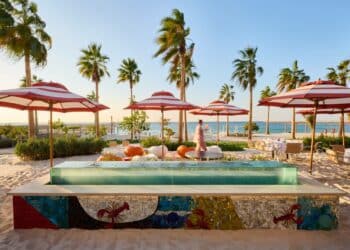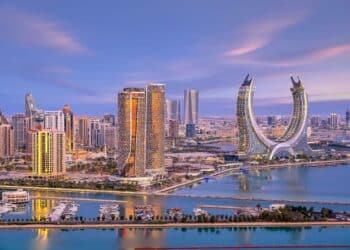We take a look at why hoteliers should run their family resort more like a cruise ship.

The value of the global family travel sector and its growth potential have been well documented, valued at $140bn in 2013, accounting for more than 12.5% of the US$1.07tn total tourism market, according to Thomson Reuters.
The market will be worth an estimated $180bn annually by 2018 and Gulf destinations such as Dubai have made no secret of their vision to take a slice of this lucrative pie.
Yet contrary to popular belief, the region’s hotel market is far from geared up to cater to this swell in family business.
While countries like the UAE boast impressive hotel construction pipelines, which include family-orientated resorts across the three- to five-star category, there are few current or upcoming properties that are truly dedicated to the needs of travelling families.
All too often a resort will adopt a one-size-fits-all strategy, whereby to maximise revenue-earning potential, it will target families during peak holiday periods but then fill off-peak gaps with corporate and MICE guests.
It means family facilities and services are often compromised because this market is not the resort’s sole focus.
This strategy, adopted by the majority of resorts in the UAE, is understandable, but it does mean the industry is behind the curve in that a niche family resort concept is lacking.
 It also means there is room to improve the region’s current resort model, according to many family resort and childcare specialists, who argue a renewed focus on what today’s family travellers demand should be taken into account, from the expectation of professional childcare services and facilities that stimulate and educate to designated dining times for kids and special children’s menus.
It also means there is room to improve the region’s current resort model, according to many family resort and childcare specialists, who argue a renewed focus on what today’s family travellers demand should be taken into account, from the expectation of professional childcare services and facilities that stimulate and educate to designated dining times for kids and special children’s menus.
This topic was hotly debated at the May edition of Arabian Travel Market where at the education session entitled ‘Family Fortunes’, video coverage of which is now available on www.arabiantravelmarket.com and YouTube, found the hospitality industry would do well to look to the cruise ship model for inspiration.
Helen Beck, regional director, International Representatives – EMEA, Royal Caribbean International (RCI), which is one of the world’s most prolific family-orientated cruise lines, told ATM delegates how the company had perfected the art of offering comprehensive and professional family facilities and entertainment programmes. Here, Beck and experts in the family travel and hospitality professionals discuss how the UAE’s hotel industry can draw inspiration from floating resorts where value for money and high-quality family fun are top of the agenda.
What the cruise experts
Beck says while the UAE boasts “many excellent resort hotels”, very few of them focus on the family segment in terms of their facilities and how they market their properties.
Both she and Lakshmi Durai, CEO of Travel Matrix, the Middle East representative for Celebrity Cruises, part of the Royal Caribbean International group, agree that while many UAE resorts organise activities for kids, few break them down by age.
“We have learned that having activities dedicated to specific age groups very much enhances all the children’s enjoyment of our onboard clubs,” says Beck.
“Three year olds have very different playing and entertainment requirements to 11 year olds so we dedicate separate rooms to each age group.”
Durai says resorts should also cater better to teens and young adults.
“Celebrity Cruises runs the X-Club for teens featuring sports and social activities including teens-only night clubs,” she explains.
Beck says it’s “critical” to offer children’s clubs out of hours too.
“One of our successes has been to run evening programmes allowing parents to have time alone,” she explains.
“On Royal Caribbean International we’ve even implemented a ‘speedy’ dining experience for families called My Family Time Dining whereby everyone has dinner together, but the kids get a faster service and are picked up by our Adventure Ocean staff when they’re done to take them back to the fun, leaving the grown ups to carry on with their leisurely dinner.”
RCI’s award-winning Adventure Ocean Youth and Teen Programme is complimentary and offers families a creative, educational and entertaining programme dependent on age with children split up into five age groups (see cruise case study 1).
In addition, family entertainment and activities available onboard are often free of charge too, so floating resorts offer “great value for money”, stresses Beck.
“In general, the only chargeable service is in-room babysitting,” she says.
Family facilities offered on Royal Caribbean ships include swimming pools, a rock wall, FlowRider, mini golf, ice skating, open-air cinema, zip line, bumper cars, Dreamworks parades – featuring well-loved characters such as Shrek, Princess Fiona, the penguins from Madagascar – plus Xbox gaming and Broadway-style shows, to name but a few.
The cruise firm has also refined its accommodation offering with families in mind.
“Royal Caribbean has debuted family-connected staterooms onboard its Quantum Class ships, which deliver more flexibility,” says Beck. “Ideal for multi-generational families, these staterooms have special layouts and provide separate bedrooms and bathrooms to ensure every family can vacation together in a hassle-free environment.”
Triple or quadruple rooms that can accommodate families together in one room are also available and ideal for parents with babies and toddlers.
Pricing wise, Royal Caribbean works to “load factors”, selling beds rather than rooms, Beck continues.
“We have a strong focus on maximising room occupancy,” she explains. “We have family pricing programmes and due to the high quality of our family services, we are able to command a premium for our triple and quadruple rooms at peak times of the year. Equally, in the shoulder seasons, we offer free child places or reduced family rates to encourage those families to travel at different times of the year.”
Beck says hotels can adopt similar room and pricing strategies during holiday season or year round to maximise family satisfaction and revenue simultaneously.
Clever sales and marketing strategies can then be rolled out to promote the hotel’s family focus, she adds.
Beck says she believes the cruise industry is the “pioneer of delivering creative, fun, engaging family holidays” that cater to all ages.
“The hotel industry could do far worse than to look at Royal Caribbean’s ‘floating resorts’ of Allure and Oasis of the Seas® to take learnings from the activities, entertainment, service and all round fun that we offer to really develop an outstanding family product,” she says.
Her topline message however, is that hotels and resorts that decide to target families must demonstrate a commitment to deliver an “excellent experience”.
“It’s not enough to just stick a sign on an unused conference room, fill it with a mixture of toys, recruit a couple of people to ‘baby sit’ the kids then call it a ‘Kid’s Club’,” she stresses.
“The family travel market is a significant one and we’ve found the children become our best ambassadors as they have such positive memories of their time onboard.”
What the childcare professionals say
It’s all very well having kids clubs and babysitting services, but unless they are run by qualified staff, discerning customers will not take these facilities seriously or be confident their children are safe in their care, stresses Beck.
She says hotels need to employ “experienced and well qualified professionals who are used to dealing with a variety of ages and nationalities”.
“Every member of Royal Caribbean’s youth programme team holds a four-year qualification in education, recreation or a related subject,” she notes. “We recruit professionals on all ships year-round, demonstrating our commitment to the family holiday experience.”
Kate Dicker, a senior consultant at Worldwide Kids Company, notes that all too often, hotels try to implement facilities without considering the operational aspects, particularly in the design of the childcare facilities and the qualifications and training of the staff.
“In the same way that resorts outsource niche services like spas, they should consider bringing in specialists to assist them in the complex area of specialised childcare,” she says.
“So often in the Middle East we see style over substance – many hotels and resorts I have visited proudly show me a highly-designed area, with pools and playgrounds as well as banks of computer games and screens. Theyfeel they provide a wonderful service, when in fact the staff are untrained and unqualified, trying to run a programme of activities written by a manager who lacks childcare expertise.”
Dicker believes few resorts in the UAE are truly dedicated to families and those who do offer childcare services often compare unfavourably to the high quality offering found on board reputable cruise lines.
“On a cruise ship the market is captive so there is no option but to provide services for all age groups. The same attitude should be true for resorts,” she argues. “In order to keep the family guests in resort, enjoying and spending their money in the on site restaurants and entertainments, there needs to be a good reason to stay and if the children of all ages are cared for brilliantly on site there is no reason to leave.”
Dicker says UAE resorts can learn from the cruise industry because “many cruise liners do childcare services very well”.
“They have really researched the market and established a niche the hotel industry would do well to emulate, particularly with their care of all age ranges. It is time for UAE hotels and resorts to take what is offered at sea and translate that to the beach.”
What the hoteliers say
One hotelier hoping to make waves in the Gulf’s hotel sector is Mike Scully, managing director of First & Foremost Hospitality, a new resort brand dedicated to families, which has set its sights on a Gulf market debut.
Scully – who boasts more than 20 years of hospitality sector experience but perhaps is best known for managing two of Dubai’s leading luxury family resorts, the Westin and Le Meridien Mina Seyahi – has teamed up with a company already excelling in this field: Mayer Family Hotels, which operates 56 top-end family hotels and resorts across Central Europe.
Scully says there are no “real players” in the GCC’s family hotel market in that no one provides a full entertainment programme.
“[But] we offer a holiday for all ages and our resorts are divided into three main areas – kids zones, mixed pools and play areas, and adults-only restaurants, bars and pools,” he says.
“Our hotels could easily be described as mini cruise ships on land due to the resemblance of facilities and care that we offer.
“For example, parents and older siblings can enjoy the attractions of a city or theme park while we look after the really young ones.”
Mayer properties include purpose-built annexes within the room for young children; a crèche for babies and toddlers operated by nurses and fully-trained carers; mini water parks; plus a theatre for kids’ productions.
“All these facilities make us quite unique and add substantial value to the property through RevPAR,” says Scully, “plus our repeat guest rate is 75%.”
Fredrik Reinisch, general manager, UAE & Seychelles, JA Resorts & Hotels, agrees there are few specialist family hotel operators in the market.
“Many high-end resorts offer a children’s club or holiday activities, but only accommodate certain age groups. Family resorts that truly cater to every member of the family are not actually all that common,” he says.
“It takes effort, time, responsibility and consistent service. Professional safe childcare adds to operating costs, so a resort has to be genuinely committed to the cause when positioning itself as a family resort.”
JA Resorts & Hotels is an exception to the rule, he says, with Dubai’s JA Jebel Ali Golf Resort offering “expert care” at a crèche that accommodate babies as young as four months.
“The crèche, CoolZone for children and ChillZone for teens are initiatives that we run with the professional expertise of the Worldwide Kids Company,” explains Reinisch.
The resort’s mission, he says, is to offer experience-seeking families a memorable holiday that makes them want to return for more.
“When Mum and Dad leave satisfied – knowing that their kids had fun, while they also had enough time for themselves – it increases the likelihood of repeat guests,” he adds.
JA Resorts & Hotels has carved a niche as a family-focused operator, with JA Oasis Beach Tower and JA Palm Tree Court recently named the ‘Top 2 Hotels for Families in the Middle East’ and JA Jebel Ali Golf Resort winning the World Travel Award as the ‘Middle East’s Leading Family Resort’ for three consecutive years.
“Of course, hoteliers can learn from cruise ships, but we believe the key to running a successful family-focussed hospitality product is a combination of [responding to] guest feedback, partnerships with specialised providers and team training,” says Reinisch.
“Suitable family additions will vary from property to property, but through these efforts we have made enhancements that resulted in loyal guests that return year after year.”


































































